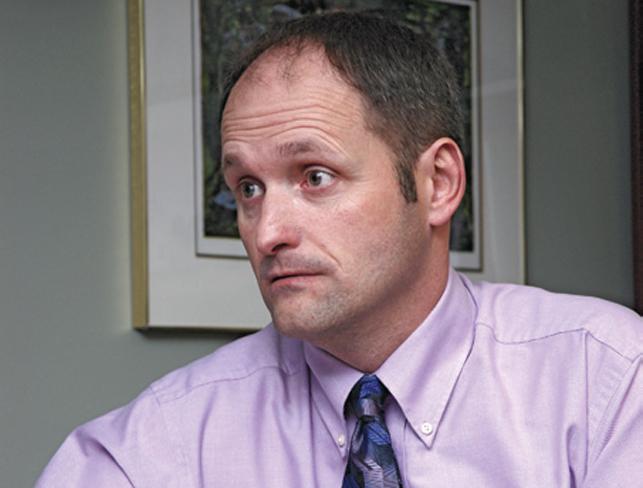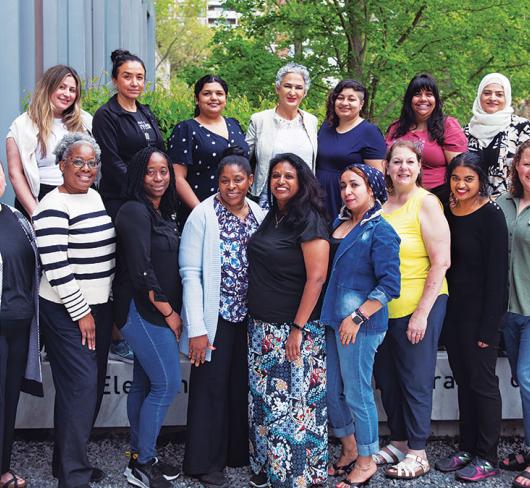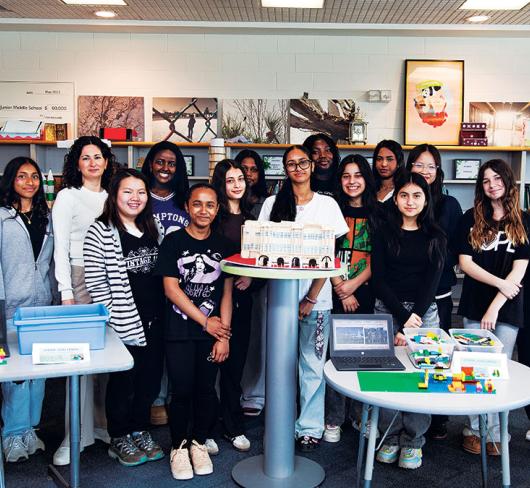
Taking on the Challenge of Local Leadership
Dave Wing is the president of the Kawartha Pine Ridge ETFO Local. He started teaching in 1989. Today he is married (to another teacher) and has two children, ages five and seven. He spoke with Voice about his leadership journey.
What motivated you to become a teacher?
Coming out of university I decided that my degree wouldn’t likely lead to gainful employment. I had some friends who were becoming teachers. Teaching was not a lifelong dream; I came to it later.
At that time employers were recruiting on campus. There was pool hiring: you knew in March that a board had hired you but you didn’t know what the job was or where you would be placed.
In my heart of hearts I wanted to teach Intermediate; I settled on grades 4 and 5 because of the location of the school. I did that for two years then I taught grades 5 and 6 for the next eight years.
Now I wouldn’t teach anything but Junior grades. I loved the children that age. They still are, if not in awe, quite taken with teachers. They want to be at school; they want to learn. The school where I taught fluctuated between 90 and 100 kids total, so I had the unique experience of not only being part of a school, but also being part of a community.
When did you first become active in the federation?
I became a steward. In a small school everyone takes on many roles, so not many were keen to take on another responsibility. I had never needed federation help, but I had colleagues who did. They turned to me and my interest developed from that. They were just asking me who they should talk to. I found the answers and realized there was a support network there, and that our school could use someone.
Then I became a local executive member and coordinated professional development workshops. In our local at that time there was no formal PD chair. I was an unreleased vice-president for four or five years, and learned more about the federation in that role. Then I became a first vice-president, which is a released position in our local.
In this local the first vice-president is grievance officer and PD chair, works on many other committees, and acts in the president’s stead – you know, “other duties as assigned.” In the last few rounds of bargaining I was the chief negotiator; that was just how the roles played out. What really piqued my interest was the impending union amalgamation in 1997–1998. Before I was in education, I never understood the need for two federations, so I was excited about the prospect of working together.
What is the most satisfying aspect of your work; what is the most difficult part?
I became president when Mark Fallis was hired at provincial office, three years ago. I had mixed emotions when that happened. The first thing that goes through your mind is that you are losing a friend in your working partnership. For four or five years I was first vice-president and he was president, and he was my mentor, teaching me the skills needed for the job.
The question that you ask yourself right away is “Am I ready?” It’s quite different to sit in the president’s chair. There is less opportunity to say, “I’m not sure, I’ll ask.” But I quickly learned that just because I moved into the position doesn’t mean I have to know all the answers. You have to be a little humble and always be willing to say, “I don’t know but I will get you the answer.” If you don’t have humility you won’t last.
At the end of the day making decisions is tough: sometimes they are popular and sometimes not, but they have to be made. Your executive or an individual teacher is looking to you for a decision.
For the first while after I became president I would leave the office and the voice in my head would be saying, “Who did I disappoint today? What didn’t I get done?” If you take the job seriously you want to be everything to anyone who needs the service. The reality is you can never finish this job; you are never done. Now I make a point of saying, “Great! Today I got these things done; tomorrow I will work on that other thing.”
You have to be able to turn the office off and go home. Today with technology the office can reach out and permeate your life in a way that could not have happened before. My wife and children, while supportive, have no problems reminding me about where my priorities should be. Having unconditional support at home makes all the difference on the difficult days.
For a while, I wasn’t taking my own advice: I always tell members any job is a job. There are things that are more important. The other thing Mark taught me is to take the job seriously but not always take myself seriously.
You earn the title of president – to my mind that’s an honour, something I have been entrusted with – but it doesn’t make me any different from any other member. I just have a different job. And that’s something you’d better remember as president. There are checks and balances in the form of elections if you don’t.
Describe your community involvements.
I became involved in the community several years ago as chair of the name change committee for the municipality of Clarington, which was previously known as the Town of Newcastle. I was on the local Liberal riding association executive and a member of the board of directors of Bethesda House, a women’s shelter. Given the after-hours demands of my current role as president, I was not able to commit myself fully to these endeavours, so I have since resigned such positions. KPR ETFO continues to promote the shelter’s fundraising efforts in the local, and we try to attend their events.
We can bring ETFO resources and energy to community organizations. For example, there was a group in Cobourg supporting grandmothers in Africa. They hadn’t thought of ETFO’s support of equity and social justice initiatives, so we were able to bring that to them. Creating partnerships in the community helps to support the positive image of teachers, the value that members bring to their work every day. It’s important to make sure ETFO has a presence at community functions and gives back to the community.
Were mentors important? Who were yours?
One person who was important is a lifelong friend who is a principal. He gets what a leader does and needs to do, and what you don’t need to do. Our friendship developed out of how he treated staff and how he treated me. I’ve learned a lot about leadership from being his friend.
When I was growing up my parents had a tourist business. I was fortunate that I could be at home and be part of the business and be parented at the same time. My parents were busy so I also learned to fend for myself and learned that you don’t rely on someone else to do things for you: if you are trying to get something done you do it yourself. As long as I remember, I was self-directed and self-motivated, which can be seen as a “leadership quality,” but it’s how I would approach any job. My parents instilled a work ethic and integrity; I still hear their voices in my ear as I approach situations: not to do this or that; to do the right thing.
Currently at the office I am blessed with Martin Higgs, our office administrator who is a retired former president of the OPSTF [Ontario Public School Teachers’ Federation, one of ETFO’s predecessor organizations]. Marsha Jones, president of the Kawartha Pine Ridge Occasional Teacher Local, gave me the push into my first role as vice-president; she convinced me to run – it hadn’t occurred to me. I use both these experienced leaders as sounding boards every day.
What advice would you give new teachers?
The hours spent outside of the classroom are a large portion of a teacher’s job. Teaching is a critical role in society and this responsibility can be overwhelming. While teachers want to be everything to every student, especially new teachers, they have to strike a balance between the job and making time for themselves and look out for their own health and well-being.
Sometimes new teachers are too quick to second-guess themselves. More often than not their intrinsic feeling of what’s right, what kids need, is the right thing to do. They have already demonstrated incredible leadership to get to where they are.
I would hope that they are aware of the opportunities in our organization to try out different leadership roles. It pays great dividends when you are involved in the federation. I urge them to try out a committee or to become their school steward and see if it is for them.
How has ETFO changed in the last 10 years?
We have had different strong leaders at the helm. With every change, we have had strong visionary leaders always taking us to new places, asserting themselves as a force in public education to effect change for members and students. Now that staff officers are assigned fewer locals, I feel that there is a closer working relationship with the provincial organization.
Teachers are gaining more strength and they are playing a more active role in determining school goals, priorities and overall school management; for example, in the previous round of bargaining we started to take more control over supervision time, working with administration to determine supervision schedules.
Through Building for Tomorrow and Close the Gap [ETFO’s collective bargaining campaigns], teachers have come to realize that their organization and their profession are something to be very proud of and that they deserve more respect than what has been given in the past. I expect that school boards are finding teachers more difficult – I would say more aware – and more willing to advocate for themselves and their students. I do think new teachers come into the profession more willing to demand the respect they deserve.

